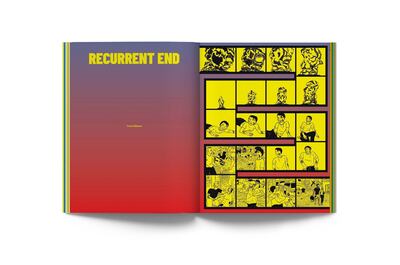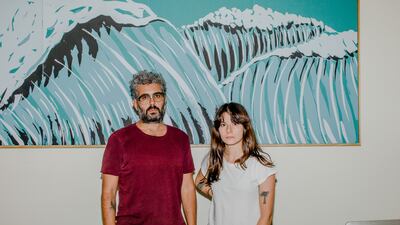Now scattered across the globe, and with their former Beirut offices still in tatters, the creatives behind the design magazine Safar came together to launch their sixth issue – their first since the port explosion – in Lebanon last month.
The magazine’s offices were destroyed during the August 2020 blast, and the ensuing economic crisis has forced most of its small team to disperse across the world. Nonetheless, they continued to work together to put out their product. “Working on the magazine made us feel hopeful,” says Maya Moumne, the magazine’s co-founder.
Safar staff began planning the issue shortly after the blast. Yet they released it in Beirut at the Souk Al Tayeb book fair in October this year, months after its official global launch in May.
Unsurprisingly, its theme is focused on power. “After the port explosion, power was an unavoidable theme. We wanted to highlight power where, for many, it remains unnoticed or, at least, unnamed,” said Moumne. “Like the constant surveillance by the technology we hold in our very own hands, to the statues and posters of politicians that stare down from our streets, or the design and creation of currency to its collapse.”
The magazine, which features Turkish female bodybuilder Oyku Basar on its cover, includes an exposé of Hezbollah’s communications strategy and a visual essay on the power of printed matter, which includes posters from the Civil Rights movement and the Namibian border war.

In October, Studio Safar, the graphic design agency which publishes the magazine, won the Tom Geismar Award 2021 from the Museum of the Avant Garde in Switzerland. The museum spotlighted projects including their branding campaign for Mauj, a Lebanese NGO dedicated to sexual health, and a fundraising poster for Lebanon comparing the country to an exploding pressure cooker.
Founded in 2014, Safar became known for its unique blend of graphic design, culture and politics. The team's innovative use of Arabic lettering and Middle Eastern visual references helped cement Beirut’s reputation as a destination for graphic design.
In May 2020, they published timely interviews with Lebanese organisations tackling the kafala system for migrant workers. These featured the portraits of Mekdes Yilma and Tsigereda Brihanu, two Ethiopian activists living in Lebanon, by photographer Myriam Boulos in Beirut.
But picking up the pieces and starting again after the blast was not easy. “As soon as we cleared the rubble and salvaged what remained, we had a short-lived hunt for a new office,” recalls co-founder Hatem Imam. “But Maya and I thankfully came to our senses shortly afterwards and decided to work from home, in order to save our resources and weather the storm.”
Then, in the year that followed, Lebanon was hit by a freefall in its currency, assassinations and severe food, fuel and electricity shortages, causing most of the team to scatter. “We managed to retain the team and stand back on our feet despite the many calamities that continue to befall the city,” he says. “But at one point we were operating from Montreal, Cairo, Boston, Istanbul, Dubai, Berlin and Paris.”
Beirut was once known as the publishing centre of the Arab world, thus contributing to the adage “Cairo writes, Beirut prints and Baghdad reads”. But today, smaller Arabic-language publishers resort to carrying books in their own suitcases from country to country owing to the costs associated with distribution, customs fees and growing censorship.
Likewise, Safar has been forced to adapt its operations to the crisis. “I moved to Montreal [after the port explosion]," says Moumne. "As soon as I got there, I registered Safar and opened a bank account so that we could continue to move our money and work independently of the power of the Lebanese authorities. Whether they like it or not, we will continue to work on a publication that addresses what they don’t want us to.”
In addition, the magazine is printed and distributed from London, which allows them to bypass the material shortages and rising distribution costs affecting Lebanon.
They still faced challenges in bringing the physical copies to the country. “We had to pay an exorbitant ‘customs clearance’ at the port in Beirut, and the copies were held hostage there for more than two months,” says Imam.
co-founder of Safar magazine
In the long run, Safar’s new set-up could allow the magazine to expand its international reach. Today, the magazine is stocked by newsagents and cultural institutions in London, Manchester, Milan, Rome, Bucharest and Seattle, among others. Their previous issue featured three short stories by the celebrated contemporary American filmmaker and author Miranda July.
It can also continue to serve a growing diaspora of Lebanese readers, as thousands leave the country by the month. “Beirut had one of the earliest graphic design programmes in the region,” says Imam. “But today a lot of people are leaving and the industry is at risk.”
Yet for Safar’s founders, publishing the magazine is a direct and necessary response to the crisis in Lebanon. “The magazine and the studio are our politics,” says Moumne. "This is one of the tools we can use to be political agents in these unfair and extremely violent conditions, to say something and to change something."
Imam says: “Producing a print magazine anywhere in the world is a daunting task; doing it from Beirut and bilingually without funding is borderline stupid, but our unwavering insistence to make things happen is our only strategy.”
Given the challenges, and the decreasing audience within the country, is there a point in bringing the hard copies to Lebanon at all? Moumne insists there is. “To keep putting these issues out in print is the need to take up physical space, literally,” she says. “The explosion felt like a tipping point – in Arabic we say 'the hair that breaks the back of the mule'. We need to speak up even more.”


